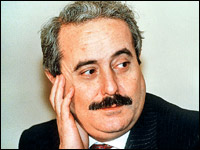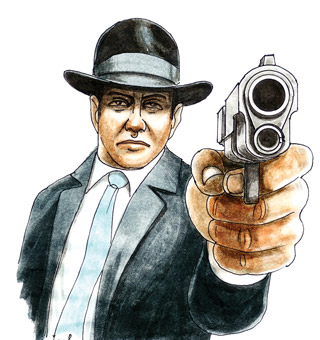Twisting the law to serve criminal ends
Lankan sleuth’s studies of the Italian Mafia :
Janaka Perera
This is a study of how the legal
process can be twisted to serve criminal objectives and dubious
political agendas in the name of helping the oppressed. It also shows
how so-called freedom fighters evolve into criminals terrorizing
society.
Those who have seen the award winning movies Godfather I and
Godfather II will have a fair idea of the vengeful and despicable nature
of the Italian Mafia - also
|

Judge Giovanni Falcone |
known as the Sicilian Mafia. In the 1986 they were at the peak of
their power when Sri Lanka’s Ramachandra Sunderalingam joined the
Interpol - the France-based International Criminal Police Organization.
Sunderalingam, an internationally-recognized narcotic drugs expert was
senior DIG (Crimes), Colombo before retirement and was one of those who
foresaw 30 years ago the rise of the North’s separatist insurgency.
The case studies he made on the Mafia for the Interpol throw much
light on some remarkable similarities between this Italian criminal
organization and the LTTE and their sympathizers worldwide.
Killing the law
In 1987-1997 `Sunda’- as his friends call him - served as Editor of
the Interpol Drugs Bulletin and made dispatches to all Interpol member
countries on Mafia activities. The organization became entrenched in
parts of Italy engaging in large scale narcotic drugs trafficking among
other illegal activity.
The Mafia went to the extent of killing not only rival gangsters,
police and State administrators but even judges who delivered verdicts
against them. One of the victims was Judge Giovanni Falcone whom Sunda
met in Rome in 1992.
In 1984, two years before he joined the Interpol, the Mafia began a
terror campaign against intrusive State institutions, targeting judges,
politicians and other public figures in Italy. The Mafia or Mafioso had
its origins in Sicily where the gabelloti were its forerunners. They
were the mediators between landowner and peasant, the urban and rural
societies.

In 1860 Mafia gangs joined Italian Patriot Giuseppe Garibaldis Red
shirts in their battle to unify Italy. When the Allied Forces landed in
Sicily in 1943 during World War II, the Mafia cooperated with them and
this alliance determined Italy’s post-war history.
Until the mid 1980s it was almost impossible to for the police to
prosecute Mafia crimes because Sicilians stuck to the code of omerta,
which prevented them revealing any information to the authorities. In
1982, the Mafia assassinated Sicily’s Communist Party Chief Pio La Torre
and a member of the Italys Anti-Mafia Commission. In the same year the
gangsters killed the Prefect of Palermo, General Alberto Della Chiesa
along with his wife and driver. In July 1983, when Chief Prosecutor
Rocco Chinnici issued a warrant for the arrest of their killer Michele
Greco, the prosecutor was blown up by a car bomb.
Anti-Mafia pools
His replacement, Antonio Caponetto formed an anti-Mafia pool in which
Judge Giovanni Falcone and Paolo Borsellino were members. Their
courageous work led to the maxi-trial of 1986. The largest Mafia trial
in history it began on February 10, 1986. The trial lasted 22 months and
took place amid growing public support for the prosecutors and constant
attempts to undermine their authority by the media and politicians.
There were even pro-Mafia demonstrations and attacks on the proceedings
by the Archbishop of Palermo!
However, a total of 344 defendants were convicted based on the
testimony of over 1,000 witnesses who revealed a worldwide network of
arms and drug trafficking.
One of the greatest achievements of the maxi-trials was to affirm the
rule of law. Yet, the anti-Mafia pools work was systematically undone.
In 1991, Italian Supreme Court Judge Corrado Carnevale alias the
sentence killer began to throw out the convictions. He overturned the
life sentence of a notorious Mafia gangster and released another - a
drug trafficker - who immediately left the country.
By the time Carnevales term was over, only 60 of the original
convictions were still in force. Policemen who had worked with Falcone
and Borsellino were transferred from their posts and documents
mysteriously mislaid.
Gradually, Falcone and Borsellino found themselves isolated and under
attack. Bureaucratic inertia, professional envy, inefficiency and
political obstruction made their positions increasingly untenable.
“I am a dead man,” Falcone told a group of fellow magistrates.
At the 1987 elections several political parties - in return for the
Mafia’s support - forced a national referendum to reduce the judiciary
powers. All of Italy’s major political parties, in the name of
supporting defendants rights, colluded in this move. The Italian
Parliament then promulgated a reformed penal code that made it more
difficult for judges to order arrests and hold prisoners in jail pending
trial. Even more ominously, the new code contained a provision under
which prosecutors could be held liable for errors, opening a whole new
field for defence lawyers to have convictions delayed or overturned.
Killing sprees
Correctly gauging the States weakness and its lack of support for the
anti-Mafia pool, the gangsters resumed their killing spree, starting
with the murder of Giuseppe Insalco, a Palermo former Mayor who revealed
the links between the Government and the Mafia organization - Cosa
Nostra. In September 1988, they killed three more prominent anti-Mafia
figures. All over Sicily judges presiding over regional mafia trials
were intimidated or bribed.
Cosa Nostra was now firmly ensconced in cities such as Milan and
Bologna, buying construction companies and banks with profits from the
narcotics drugs trade and then bidding for lucrative public works
contracts in Sicily through legitimate businesses. On May 23, 1992 Judge
Falcone, his wife Francesca Morvillo, flew to Palermo from Rome on a
Government plane. They had been scheduled to leave a day earlier, but
changed their departure date at the last minute.
They were met at Palermo Airport by three police cars and seven
bodyguards. The added precaution of helicopter surveillance formerly
standard practice had been withdrawn to cut costs. Falcone decided to
drive his own car, his wife beside him. His driver took a back seat.
When the convoy reached Capaci, a large charge of plastic explosive
placed under the highway was detonated by remote control.
Three policemen in the lead car were killed instantly. Falcone and
his wife were seriously injured and both died later.
The horrifying crime shocked Italy. Falcone had become a symbol of
hope and the possibility of reform. The public regarded him as a martyr,
and many suspected Government complicity in his murder. A strike was
called in Sicily. The Italian Parliament declared day of mourning and
suspended its sessions until, after the funeral. For almost the first
time Palermo citizens openly displayed their grief and anger.
Only July 19, Falcones colleague Borsellino and five bodyguards were
blown up by a car bomb placed outside his mothers house in Palermo.
According to Sunda these crimes caused panic in Government circles
and requested Interpol assistance to deal with the situation. The
assassinations eventually forced the Italian Government to act. Four
days after Borsellinos death, Prime Minister Giuliano Amato sent 7,000
troops to Sicily in effect proclaiming martial law. New informers came
to the States assistance and according to one of them Cosa Nostras aim:
“To hold the State to ransom to force it to revoke the laws...”
Combating Mafia
Sunda recalls that in 1996 top Italian judges were visiting European
Police agencies to get their full cooperation in curbing Mafia activity.
In the same year, Interpols Secretary General Ray Kendall told Sunda
to be ready with a presentation to the Italian authorities on heroin
trafficking by Mafia via the Balkan route to Italy and other countries.
The former DIG says: “Strangely, I was not notified of the date but
told to standby one week Monday to Friday. The reason being that after
the Falcone incident, the Italian top brass did not want to take any
chances. Suddenly one Wednesday morning at 9 a.m. during the week I was
asked to be present at 10 a.m. for the briefing. I gave it in the
Interpols special auditorium to six senior Italian judges. They
requested a CD copy of my presentation with all drug trafficking routes
and case studies.”
Secretary General Kendall highly commended Sunda for his excellent
contribution. It took a major effort on the part of the Italian
authorities before they could bring down the Sicilian Mafia to its
knees. Its head Bernardo Provenzano vanished and his whereabouts are
unknown.
Mafia Robinhoods
Sundaralingam sees some these Mafia types trying to appear as
philanthropists and respectable citizens by championing the cause of
society’s less fortunate. The early life of these crime bosses perhaps
contributed to this mindset. One example according to him is Colombian
Drug Lord Pablo Escobar - the first Mafia leader to start a cocaine
enterprise in Latin America. He was so poor when he was young that once
he was sent home from school because he had no shoes. Escobar studied
political science at Universidad de Antioquiq but was forced to drop out
when he couldn’t afford to pay the fees.
This was the beginning of his criminal career. He assassinated
presidential candidates, judges, police officers and senior military
personnel, any one who worked against him. CNN called him the ‘Coke King
of America’ and the BBC called him the ‘Prince of Darkness.’ His name
appeared in the Forbes Magazine as one the richest men in the Americas.
He owned innumerable luxury residencies and automobiles and in 1986 he
attempted to enter Colombian politics, even offering to pay off the
nation’s $10 billion national debt. A lifelong sports fan, he was
credited with building football fields and multi-sports courts, as well
as sponsoring little league football teams.
Escobar was responsible for the construction of many churches in
Medellin, which gained him popularity. The people of Medellin called him
‘Robin Hood,’ as he helped the poor with hospitals, schools, roads, etc.
According to a Colombian Police officer, a friend of Sundaralingam, even
today after his violent death 17 years ago, (1993) his admirers continue
to place flowers at his graveyard. |



